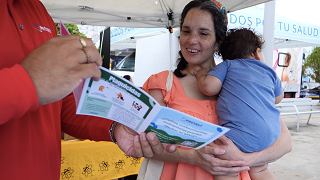Science Leadership
The NIEHS Superfund Research Program (SRP) welcomes a new member to the team: Alicia Zorn, who joined the team in July 2023 as a Health Specialist.
SRP released a video that highlights the program's mandates, current research, and impacts. The video features interviews with former NIEHS Director Kenneth Olden, Ph.D., former SRP Director Bill Suk Ph.D., Virginia Guidry, Ph.D., of the North Carolina Department of Health and Human Services, and Elizabeth Martin, Ph.D., of NIEHS. Other interviewees include Veronica Carter, of the North Carolina Coastal Federation and a partner of the Duke University SRP Center, and several SRP-funded trainees:
- Amanda Armijo, Massachusetts Institute of Technology (MIT)
- Alexandra Cordova, Texas A&M University
- Laura Dean, University of Iowa
- Matthew Dunn, University of Rhode Island
- Francisco Leniz and Ariel Robinson, University of Kentucky
- Breandon Taylor, University of Louisville
SRP Acting Director Michelle Heacock, Ph.D., was part of the planning committee for the Molecular Signatures of Exposure in Cancer workshop. Co-hosted by NIEHS and the National Cancer Institute, the virtual workshop was held June 29-30. Heacock also hosted a session on challenges in tracking signatures of exposures that was moderated by Rebecca Fry, Ph.D., Director of the University of North Carolina at Chapel Hill SRP Center. Ana Navas-Acien, Ph.D., Director of the Columbia University SRP Center, and John Essigmann, Ph.D., of the MIT SRP Center, presented during the session and participated in a panel discussion.
SRP Health Scientist Administrator Heather Henry, Ph.D., and Health Specialist Brittany Trottier, M.P.H., helped plan the 2023 Diverse Researchers Integrated Virtual Network (DRIVEN) meeting. Held July 19-20, the meeting aimed to create networking opportunities among NIEHS Diversity Supplement Scholars, facilitate interaction with NIEHS staff, and increase participation in career development opportunities. Henry provided welcome remarks during the first day of the meeting and Trottier moderated several sessions.

Seven exceptional SRP trainees received a 2023 K.C. Donnelly Externship Award Supplement. This year's awardees are Eric Brown, Asta Habtemichael, Nobel Hernandez-Ortero, Victoria Klaus, Will Lieberman-Cribbin, Irene Martinez-Morata, and Sara Thomas.
Researchers at the University of California, Berkeley SRP Center and collaborators developed an approach to help risk assessors predict the toxicity of chemicals based on shared characteristics. Led by Martyn Smith, Ph.D., the team reviewed large chemical databases to identify similar traits across compounds and defined key characteristics shared by chemicals with similar health effects. This key characteristics approach can inform chemical risk assessments and public health policy.
SRP-funded researchers were recently featured in NIEHS highlights:
-

Through strong community partnerships, PROTECT uses pamphlets, social media, and digital apps to share results with the public to lower rates of preterm birth and improve babies' health. (Photo courtesy of PROTECT SRP Center). The Puerto Rico Test Site to Explore Contamination Threats (PROTECT) SRP Center, led by Northeastern University, was featured in an NIEHS Translational Research Story (1MB). Since 2010, PROTECT has modeled groundwater contamination, identified personal care products as exposure sources, and cleaned up contaminated water sources.
- Johnnye Lewis, Ph.D., appeared on a recent episode of Global Environmental Health Chat, a podcast series hosted by the NIEHS Global Environmental Health program. Lewis describes her work to understand the health implications of exposures to environmental pollutants from hardrock mining activity.
- Kelly Pennell, Ph.D., director of the University of Kentucky SRP Center described was inspired her to pursue a career that help people affected by exposure to toxic substances like PFAS, trichloroethylene, and tetrachloroethene. To learn more, see her NIEHS Grantee Highlight.
to Top



